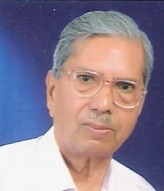Fighting Flames in Indo-Pak War, Barmer 1971
Category:
Tags:

I C Srivastava was born in 1943. A student of English Literature, he joined the Indian Administrative Service in 1966. During his 37 years tenure, he was Collector/ District Magistrate of three districts, served as the Chairman, Board of Revenue, Rajasthan, and retired as Chairman, Rajasthan State Mines and Minerals Corporation. He has authored several books in Hindi and English. Nowadays, he is associated with various social and cultural activities in Jaipur.
In 1971, I was the Collector and District Magistrate of Rajasthan's Barmer district (area over 28000 sq. kms.), which has a border with Pakistan.
After the outbreak of Indo-Pak War on 3 December 1971, Barmer witnessed a series of bombing operations by Pakistani warplanes. These planes would usually fly out from Badin Airfield in what was West Pakistan at that time. On the very first day and the night itself, Pakistan Air Force planes destroyed an Indian Air Force aircraft at Uttarlai airfield in Barmer district and martyred one Indian airman. After random and intermittent bombing of Chohtan, a border tehsil town, and the bed of a rural water tank near Parehpadra Tehsil headquarters, Pakistani warplanes mounted an air assault was mounted on the Railway Station in Barmer city on the night of 8December 1971.
As District Magistrate and ex-officio Civil Defense Controller, it was a part of my essential duties to inspect and find out first-hand the impact of and the damage caused by enemy air sorties and bombing.
Shri Shantanu Kumar, my batch-mate and Superintendent of Police, Barmer (he eventually rose to be Director-General of Police, Rajasthan) picked me up around 11:45 PM. We drove in his jeep to the Railway Station. There we witnessed a most horrifying and terrible spectacle. Railway godowns were burning. Flames were rising and spreading from the tracks and goods wagons stationed at the Railway Station. The damage was significant. Luckily there were no casualties. But the flames were continuing to spread.

L to R: Wing Commander V K Murthy, I C Srivastava, Shantanu Kumar. Barmer. 1971.
We were also overwhelmed by the spirited action of the local citizens. They had come forward in large numbers and organized themselves, on the spur of the moment, into groups with hammers and buckets full of water. Hammer to unhook and separate the burning wagons, and water to put out the leaping flames. It was highly motivating and inspiring to see the citizens acting in concert and unity in that emergency. The main aim was to prevent the leaping fires from spreading towards two cinema halls and nearby town areas.
Water was not readily available in Barmer, as it is located in a desert area. Someone from the crowd informed us that that sand from the nearby dunes would be effective in fighting the napalm bomb flames. An expert Civil Defense officer had already advised us on this issue and arrangements were made to transport sand-filled trucks to the railway station. One such vehicle was already on its way. We met that truck on our way back in what turned out to be a near brush with death. The truck, fully loaded with sand and driving in the curfew enforced darkness, did not spot our jeep. In all likelihood, it was going to ram us. We survived because of the last moment, quick, and intuitive swerve of the steering wheel by Shantanu Kumar. The side of the jeep ended up hitting a telephone pole. But we were none the worse for wear! It was a providential escape for us.
We reached our homes without further incident. It was now back to our temporary offices of operations - our underground kuccha (temporary) bunkers - (10' X 10' X 10') at home.
This unforgettable event, embedded in my memory, will always remind me of the heroic endeavour of Barmer's citizens. I addressed them the next morning. A simultaneous broadcasting network had already been laid all over the town. The broadcast was to congratulate them for the previous night's labour of patriotic love and to raise their morale. My appeal and vivid narration of the valiant saga of their brethren and fellow citizens did seem to boost the confidence and spirit of the people. The business community had started fleeing the town in buses. The raised morale helped in ebbing this flow. Government officers and their families, living in the residential colony, who were braving the likely bomb-shelling day in and day out, also set an excellent example for other citizens to follow.
When the departure of the business community stopped, a delegation of citizens came to meet me. They were seeking night protection and air cover by our warplanes. We had already spoken to officers in the air command headquarters at Jodhpur. The assured us of night air protection to be provided by Mig-19 planes. The planes landed the same afternoon - the bang of the breaking sound barrier announced their arrival.
Needless to add, people felt assured of air protection and our air force's ability to keep the enemy planes at bay after the 9th of December. However, in the day time on the 10th December, there was a dog-fight between Indian Air Force Gnats and Pakistani Air Force planes over Uttarlai Air Field at about 9.30 AM. The dog-fight proved to be another memorable and unforgettable event in the war history of Barmer. Our smallish looking Gnat aircraft not only gave a good fight but finally chased away the enemy planes.
__________________________________________
© I C Srivastava. Published July 2019.
Add new comment